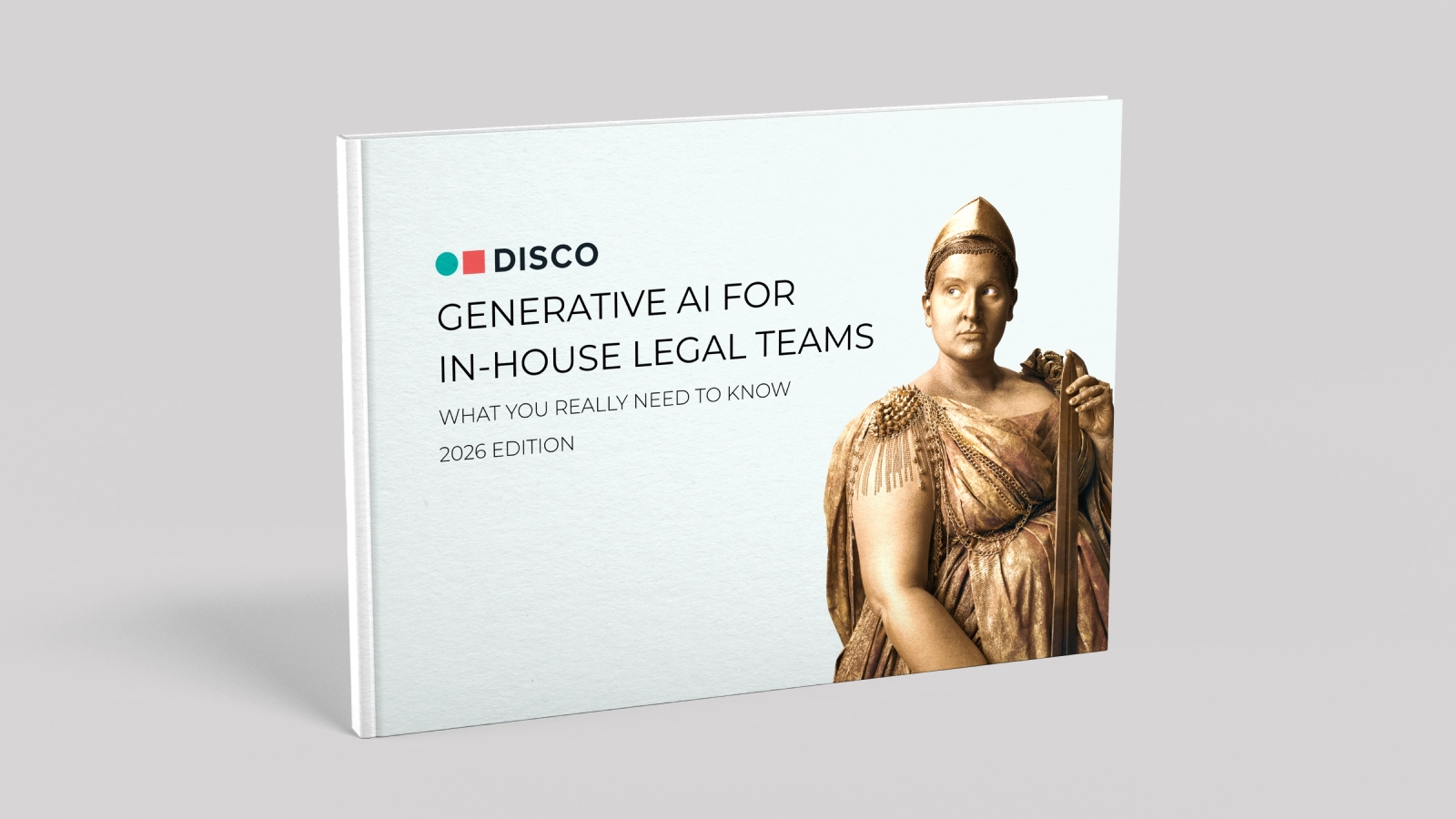⚡️ 1-Minute DISCO Download
Artificial intelligence (AI) is no longer a future-forward concept. It’s here, and it’s integrated into, and hence changing, the legal landscape in real time. From fact analysis to document review, AI tools are not just augmenting legal practice, they’re redefining it, underscoring an urgent need: Your law firm needs a robust AI policy, and it needs one now.
Ignoring AI is no longer an option; it may even be a dereliction of professional duty. The American Bar Association (ABA) Tech Survey found a significant increase in AI adoption among law firms, with 30% of respondents using AI technology in 2024, up from just 11% in 2023. Personal use of generative AI by legal professionals also rose from 27% to 31% in the same period. This widespread, and often unmonitored, adoption makes the need for defensible AI policies even more critical.
This article will break down the core components of a strong AI policy, offering actionable steps to address key elements like data privacy, professional responsibility, and the practicalities of integrating AI while maintaining client trust.
Why your law firm needs an AI policy now
Whether sanctioned or not, AI is already in your firm.
Many legal professionals are experimenting with publicly available generative AI tools like ChatGPT, Claude, or Gemini for various tasks, from drafting emails to preparing presentations; from data analysis to conducting preliminary research.
While these tools offer undeniable convenience and efficiency, they are often used without a full understanding of how they work, and hence of their limitations or the potential implications for sensitive client data. The lack of a clear policy means that inconsistent practices, varying levels of sophistication in handling these tools, and unmitigated risks may already be present within your firm.
The risks of using AI in legal settings absent appropriate safeguards
The unsupervised or ill-informed use of AI in a legal context can lead to serious repercussions. The unique nature of legal work — dealing with highly sensitive information, complex legal precedents, and stringent ethical codes — amplifies these risks.
Confidentiality issues
When AI systems process sensitive data without adequate safeguards, the risk of data leaks or unauthorized disclosures becomes alarmingly high. Publicly available AI tools, for instance, often train their models with user input, meaning any confidential client information entered into them could become part of the AI's training data, potentially (even if indirectly) accessible to others. Firms must ensure that any AI platform used complies with stringent data protection standards, including robust encryption, secure storage, and vendor adherence to legal industry best practices.
Bias
Generative AI models, that leverage Large Language Models (“LLMs”), are trained on vast datasets – think the internet as a whole – and naturally, those datasets contain or could be skewed by historical biases, meaning that any AI trained on them could also inadvertently perpetuate and even amplify those biases in its outputs, such as legal reserch. Addressing bias requires careful selection of AI tools, continuous monitoring of outputs, and human oversight to identify and mitigate prejudiced results.
Hallucinations
Because LLMs essentially calculate probabilities when determining what an answer or even the next word in a sentence should be, they are known to "hallucinate," meaning that LLMs can generate plausible-sounding but entirely false information, including fabricated case citations, statutes, or legal arguments. Several high-profile instances have already emerged where lawyers submitted AI-generated legal briefs containing nonexistent case law, leading to potential sanctions. This highlights a critical need for rigorous human oversight of AI-generated content, by way of scalable and defensible processes and workflows.
The ethical obligation: Why an AI policy isn’t optional
The ethical duties of lawyers are not diminished by the advent of new technologies; rather, they are expanded to encompass the responsible use of these tools.
The legal profession's core ethical obligations argue in favor of implementing AI policies:
Duty of Confidentiality (Model Rule 1.6)
This is perhaps the most immediate and critical ethical concern related to AI. Lawyers must take reasonable measures to protect sensitive client information. Using AI tools without understanding their data-handling practices, or using public tools that may use data for training, directly jeopardizes client confidentiality.
A robust AI policy will mandate the use of secure, privacy-compliant AI platforms and prohibit the input of confidential data into unapproved systems.
Duty of Supervision (Model Rules 5.1 & 5.3)
Lawyers are responsible for the work product of their non-lawyer assistants and junior attorneys. This duty applies no less to the oversight of AI tools when these tools do a lot of work that once upon a time used to be the province of humans..
AI is a tool, not a substitute for human judgment. Attorneys must rigorously review AI-generated outputs to ensure accuracy, compliance with professional standards, and alignment with legal strategy. The ABA's Formal Opinion 512 explicitly recognizes that while AI can enhance legal practice, lawyers must supervise and validate AI-generated work.
In essence, a comprehensive AI policy is not merely a best practice. It is an ethical imperative. It provides the necessary framework for lawyers to embrace AI's benefits while fulfilling their fundamental professional responsibilities.
Duty of Competence (Model Rule 1.1)
Lawyers have a duty to provide competent representation, which includes staying current with the benefits and risks associated with relevant technology. Ignoring AI or failing to understand its capabilities and limitations can be considered a breach of this duty.
Building the foundation: What an AI policy really is
Before diving into the specific components, it's crucial to understand what an AI policy truly represents for a law firm. It's more than just a set of rules; t's a strategic document that reflects the firm's commitment to innovation, ethical practice, and risk management in the age of artificial intelligence.
Defining an AI policy: Purpose, scope, and relevance to legal teams
An AI policy is a formal document that governs how AI technologies are used within your firm. For instance, a robust AI policy would:
- Clarify which sorts of AI tools are approved (and which aren’t)
- Define acceptable use cases
- Outline responsibilities and supervision protocols
- Set standards for data handling, privacy, and security
- Align AI use with ethical and regulatory requirements
Think of it as your internal “terms of use,” and also as a roadmap to help your team navigate the AI terrain confidently and ethically.
What makes an AI policy effective
To be successful, your policy should be:
- Clear and accessible: Avoid overly technical jargon. Your policy should be easily understandable by all employees regardless of their technical proficiency.
- Flexible and adaptable: AI is evolving. Your policy should too. An effective policy is designed to be reviewed and updated regularly to reflect new developments.
- Role-specific: Tailor sections for IT, legal professionals, marketing, etc. – indeed, consider the different practice areas in your firm, and the different ways in which each might use AI (and thus the different tools that they might use).
- Enforceable: Include governance structures and escalation processes. An AI policymust clearly define responsibilities for adherence to the policy and outline consequences for non-compliance.
- Client-facing when needed: Be prepared to provide transparency and explain your AI use to your clients. An effective policy is supported by ongoing training programs that ensure all employees understand its provisions and the responsible use of AI.
🎬 Access our latest webinar here to learn how to confidently discuss AI with your clients.
Core components of a strong AI policy
A comprehensive law firm AI policy must address specific technical, ethical, and practical considerations. These components serve as the building blocks for a robust framework that enables responsible AI adoption.
Let’s break down the most important elements your AI policy should include.
LLM architecture
Understanding the architecture of Large Language Models (LLMs) is key because it directly impacts data security, confidentiality, and the reliability of outputs.
While the policy itself doesn't need to be a deep dive into neural networks, it should address the implications of different sorts of tools and how they leverage LLMs. For instance, the policy should clearly distinguish between publicly accessible LLMs (e.g., consumer versions of ChatGPT, Gemini) and enterprise-grade or privately hosted models. (For instance, with the former, any confidential or sensitive client data fed into public models, will often be used as inputs for training other users, potentially compromising confidentiality.)
While full transparency into an LLM's "black box" is often impossible, the policy should encourage the selection of AI tools that offer some degree of explainability or provide clear documentation on how their models are trained and what data sources are used. This helps in understanding potential security issues or limitations.
🧑💻 Read our article on the different types of AI and LLMs.
Reliability & verifiability
Reliability and verifiability are of paramount importance. This component of the policy should thus encourage rigorous oversight, with a view to those two pillars. he point isn’t that oversight should be “merely” human or entail human re-work, but that it should be part of a process geared towards statistical defensibility, data-driven measures of quality, and should focus human expertise on AI gaps and blind spots.
💡Pro tip: Look for AI tools that provide direct citations or links to the information they use to generate answers. This feature is your best friend for verifying accuracy and ensuring the reliability of the AI's output.
Enterprise hosting & data security
Data security and client confidentiality are non-negotiable. This section of the policy should outline the technical and procedural safeguards required for AI implementation.
Key considerations include:
- Does your GenAI vendor retain your LLM prompts and outputs beyond your user session? If so, what is the vendor’s retention policy?
- Are your LLM prompts or outputs used to train the vendor's models?
- Does your vendor engage in human review or auditing of your prompts, data, or output passed to LLMs? If so, what is your vendor’s policy with regard to such access?
- If you and your vendor have activities in the EU, is your vendor GDPR-compliant?
🔒 Dive deeper into the intricacies of GDPR compliance in this article.
Ethical issues
Beyond confidentiality, a strong AI policy must proactively address broader ethical considerations, such as:
- Are LLMs being used in a way that runs the risk of copyright infringement?
- What does the lawyer need to know about the tool to be considered competent (see Model Rule 1.1)?
- Is the LLM appropriate for the subject matters on which it will be used, given that some LLMs tend to have a bias when generating content for certain subjects?
Considerations specific to particular legal services
This section of your policy should consider how differences in legal services and legal contexts dictate differences in AI usage.
Consider addressing questions such as:
- Would the GenAI be used purely for internal purposes, or to satisfy an external obligation? For instance: auto-review of documents to meet a production deadline (external), contract generation (internal), legal research (external), etc.
- AI-use considerations will be different for different legal services (e.g. litigation ediscovery versus preparation of contract documents; or legal research versus post-execution contract management)
- Is the GenAI tool used in any legal work at all, or for general office/professional work? For instance: email composition, presentations, etc.
- What sort of process mapping is possible to record AI usage? The answer impacts risk management and defensibility.
By meticulously addressing these core components, a law firm can create an AI policy that is broad enough to cover the range of legal services and practice areas it engages in, enabling it to responsibly harness the transformative power of artificial intelligence while mitigating risks.
Implementing and maintaining your policy
Drafting an AI policy is only the first step. For it to be truly effective, it must be embraced, embedded, and continuously refined within the firm's culture and operations. Implementation and ongoing maintenance are crucial for the policy's success and the firm's long-term resilience in the AI era.
Getting buy-in: Engaging leadership, IT, legal ops, and client-facing teams
Successful policy implementation hinges on firm-wide buy-in, particularly from key stakeholders. Without their commitment, the policy risks becoming a stagnant document.
- Leadership engagement: Securing strong support from the firm’s leadership (managing partners, executive committee) is key. AI should be accurately framed, as a strategic imperative, outlining, both, the opportunities (efficiency, competitive advantage) and the risks (ethical breaches, data security, potential challenges to the firm’s staffing model) that necessitate a policy. Emphasize that a proactive approach protects the firm's reputation and client relationships.
- IT department involvement: IT is central to AI implementation and security. Engage your IT department early to assess technical requirements, evaluate AI platforms, ensure data security measures are in place, and integrate AI tools with the firm's existing infrastructure. Their expertise will be vital in identifying secure enterprise hosting solutions and setting up robust data protection protocols.
- Legal Ops participation: Legal Ops teams are focused on efficiency and process improvement. Involve them in defining approved AI use cases, identifying workflows that can benefit from AI, and measuring the impact of AI adoption on productivity and costs. They can help embed the policy into practical operational guidelines.
- Client-facing teams (attorneys, business development): These teams are on the front lines of client interaction and will be directly impacted by AI use. Educate them on the policy's importance for client confidentiality and trust. Equip them to communicate transparently with clients about AI usage, address concerns, and highlight benefits. Involve them in pilot initiatives to engage with technology and services providers, and encourage their feedback on practical challenges and opportunities in applying the policy in their daily work.
- Cross-functional AI committee: Consider establishing a dedicated committee comprising representatives from leadership, IT, legal ops, and various practice groups. This committee can champion the policy, address ongoing challenges, and ensure a unified approach to AI adoption.
Embedding the policy into your firm’s culture and work
An AI policy shouldn't be a standalone document. It needs to be woven into the fabric of the firm's daily operations and professional ethos.
Follow these best practices:
Integrate into onboarding and training
Make the AI policy a part of onboarding for all new hires. Incorporate it into existing training programs for attorneys and staff.
Develop clear procedures and checklists
Translate policy principles into practical, step-by-step procedures or checklists for common AI use cases. For example, a checklist for drafting a legal memo using generative AI might include steps like "Input only non-confidential facts," "Verify all generated citations," and "Review for tone and accuracy."
Promote an "AI-aware" mindset
Foster a culture where employees are constantly mindful of AI's capabilities and limitations. Encourage critical thinking about AI outputs and emphasize that human judgment remains supreme.
Lead by example
Firm leadership and senior attorneys should visibly adhere to the AI policy, demonstrating its importance through their own practices.
Internal communication channels
Establish dedicated internal communication channels for updates on the AI policy, best practices, approved tools, and answering FAQs.
Staying ahead of AI evolution and legal updates
Proactive engagement with the evolving AI landscape is crucial for long-term policy effectiveness.
Practice the following:
- Commit to ongoing research: Designate individuals or a committee to actively research new AI technologies, emerging risks, and best practices in AI governance.
- Participate in industry discussions: Engage with legal tech communities, professional associations, and conferences to stay abreast of AI developments and their implications for legal practice.
- Anticipate future needs: Consider how future AI capabilities might impact the firm's services and operational structure. This forward-looking perspective helps in developing a policy that remains relevant and adaptable.
- Collaborate with AI providers: Maintain open lines of communication with approved legal tech partners to understand their development roadmaps, security enhancements, and compliance efforts.
By meticulously implementing, training on, and continuously refining its AI policy, your law firm can transform a potential liability into a strategic asset.
5 actionable steps to kickstart your firm’s AI policy journey
The confluence of rapid AI adoption, inherent risks, and clear ethical obligations means that inaction on AI is the greatest liability. The time to start building your firm's AI policy is not tomorrow, but today.
Overwhelmed by where to begin? Here are five concrete steps your firm can take right now to kickstart its AI policy journey:
- Assess current AI usage: Inventory tools and use cases across the firm
- Form a working group: Include stakeholders from legal, tech, and leadership
- Draft a policy framework: Use this blog as a guide to structure your first version
- Test and refine: Pilot the policy with a few teams before full rollout
- Educate and enforce: Train staff, track compliance, and refine as needed
Don’t wait for someone else’s crisis to shape your strategy. Start building your AI policy today.
Ready to get started? Book a demo with our legal tech experts today and discover how we can help you craft a comprehensive AI policy tailored to your firm's unique needs.

.jpg)












